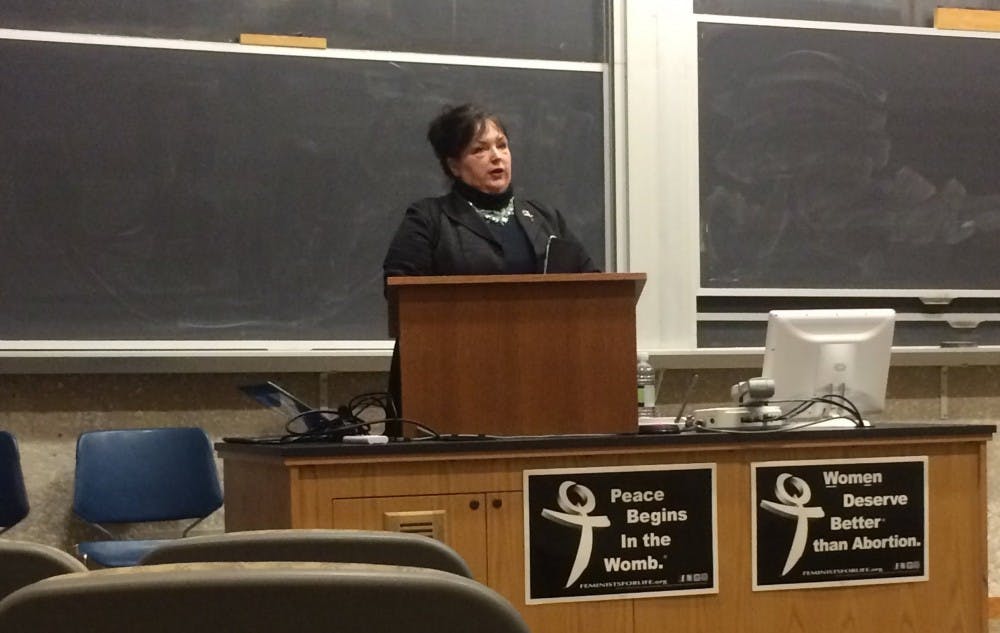Voice for Life, a pro-life student organization, invited Feminists for Life (FFL) president and creator of the Women Deserve Better campaign, Serrin Foster, to deliver her pro-life speech “The Feminist Case Against Abortion” on Tuesday.
Foster has led FFL since 1994. She focuses on developing on-campus resources for under-served pregnant and parenting students. Foster also says she promotes a feminist perspective on abortion, emphasizing the importance of tackling poverty and gender violence issues at the root of abortions.
“Feminism rejects the use of force to dominate, control or destroy anyone,” Foster said.
Foster began her speech by talking about Susan B. Anthony and other first wave American feminists, who were against abortion. According to Foster, while these early feminists recognized that women were responsible for their choice to undergo abortion, they believed that a lack of autonomy, financial resources and emotional support drove these women to abortion.
She read from early American feminist Victoria Woodhull’s newspaper, which stated that the rights of children begin when they are fetuses.
Foster continued explaining the historical correlation between pro-life ideas and feminism by describing second-wave feminists, such as Alice Paul, who called abortion “the ultimate exploitation of women.”
According to Foster, Roe v. Wade, the Supreme Court case that legalized abortion, has shortcomings. She focused on attorney Sarah Weddington’s pro-abortion arguments that detailed the injustices faced by working class pregnant women. Foster criticized Weddington for stating that women need a relief from pregnancy, rather than relief from the injustices they face.
“It’s her body, it’s her choice and society says it’s her problem,” Foster said.
Foster spoke about her encounter with a student who confided in her that she had been raped at 13 and put the conceived child up for adoption. When asked why she chose not to abort, the girl responded that she did not want to perpetuate violence.
“I would never do to my kid what that guy did to me,” the student said according to Foster.
For Foster, pregnancy resulting from rape is a divisive issue that challenges pro-life beliefs. She encourages solidarity with women who have conceived during rape and welcoming their children.
“As feminists, we are advocates of peace and justice,” Foster said. “As feminists, we would never trade one form of violence for another.”
To Foster, the root causes of abortion make it a feminist issue. Citing statistics from the Guttmacher Institute, she said that three quarters of women who get an abortion are economically disadvantaged and 61 percent are women of color. Half of the women who get abortions have had one before, demonstrating to Foster that abortion is not a permanent solution to root causes, such as poverty.
Foster quoted Mattie Brinkerhoff, a historical figure, who said, “When a man steals to satisfy hunger, we can safely assume that there is something wrong in society.”
“So when a woman destroys the life of her unborn child, it is an evidence that she has been greatly wronged,” Foster continued.
Root causes, according to her, should also be addressed at a college level. Foster felt that many colleges make pregnant students feel unwelcome and lack resources to accommodate these women.
Foster stated that in addition to teaching pro-life feminist history, FFL has moderated Pregnancy Resource Forums at campuses across the country. She mentioned the University of California, Berkeley, Wellesley College and St. Louis University as examples of campuses that have taken pro-life action to accommodate to their pregnant students.
Junior Elisabeth Wood, a member of Voice for Life, feels that abortion is a stigmatized issue on campus. She thought Foster’s speech was needed to break the silence around the issue and give a pro-life perspective.
Wood felt that many women go through unwanted pregnancy without support and lacking resources. These women, she stated, deserve to have their voices heard.
According to Wood, Voice for Life advocates for bioethics and creating a culture on campus that supports life. Wood stated that abortion is one of their key issues.
“[We’re] raising awareness about the issues and hearing what people think and engaging in dialogue and creating an atmosphere on campus that’s really supportive for pregnancy and pregnant women,” Wood said.
Freshman Amani Nelson enjoyed that Foster took a pro-life feminist approach. To her, this perspective lacks media exposure. She found that predominantly affluent, white individuals dominated the conversation about abortions, despite the majority of abortions being performed on women of color.
“People on both sides of the aisle kind of ignore the fact that this is a poverty issue and that this really is something that should be brought to by feminists on both sides,” Nelson said.
Update: This article has since been updated to include the source for the statistics from the Guttmacher Institute and the quote from Mattie Brinkerhoff.





